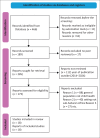Ubuntu philosophy as a strategy to promote access to under-five child healthcare services
- PMID: 40599043
- PMCID: PMC12224017
- DOI: 10.4102/curationis.v48i1.2667
Ubuntu philosophy as a strategy to promote access to under-five child healthcare services
Abstract
Background: Inaccessibility of healthcare services for children under five contributes to child morbidity and mortality in sub-Saharan Africa. Children are reportedly dying at home from treatable conditions, hence the need for this study.
Objectives: The study aimed to exploring and synthesising the barriers in accessing under-five child healthcare services through the lens of ubuntu philosophy in sub-Saharan Africa.
Method: An integrative literature review was conducted. Several databases were searched utilising a combination of phrases such as: 'access', 'barriers', 'child healthcare services' and 'sub-Saharan Africa'. Qualitative and quantitative studies, published between 2014 and 2024 in sub-Saharan Africa, were used.
Results: Study findings revealed that there were parental- or guardian-related factors, healthcare provider factors and healthcare environment factors that can hinder access to healthcare services for children under the age of five.
Conclusion: Intervention measures to address the barriers to access of healthcare services by children under five should embed ubuntu values by all healthcare providers and policymakers. Continuous health education to empower parents and guardians on childcare practices is recommended.Contribution: The study provides insights into challenges of accessing child healthcare services. These findings are key for nurse managers, nurse educators and policymakers to better plan for comprehensive quality service provision. Leveraging on Ubuntu philosophy would be pivotal to making a critical analysis of these challenges and how to address them.
Keywords: access; barriers; children under five; strategy; ubuntu..
Conflict of interest statement
The authors declare that they have no financial or personal relationships that may have inappropriately influenced them in writing this article.
Figures
References
-
- Ahinkorah, B.O., Budu, E., Seidu, A.A., Agbaglo, E., Adu, C., Ameyaw, E.K. et al. , 2021, ‘Barriers to healthcare access and healthcare seeking for childhood illnesses among childbearing women in sub-Saharan Africa: A multilevel modelling of demographic and health surveys’, PLoS One 16(2), e0244395. 10.1371/journal.pone.0244395 - DOI - PMC - PubMed
Publication types
MeSH terms
LinkOut - more resources
Full Text Sources
Medical

